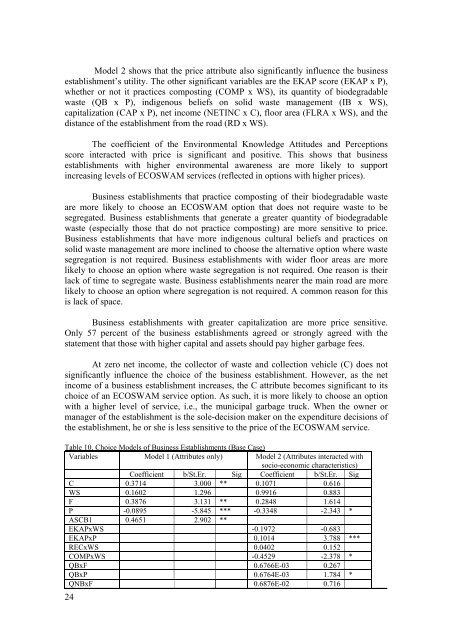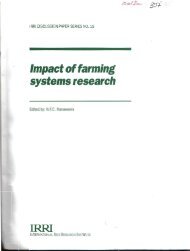Naz, Antonia Corinthia C and Mario Tuscan N. Naz. 2006. Modeling ...
Naz, Antonia Corinthia C and Mario Tuscan N. Naz. 2006. Modeling ...
Naz, Antonia Corinthia C and Mario Tuscan N. Naz. 2006. Modeling ...
You also want an ePaper? Increase the reach of your titles
YUMPU automatically turns print PDFs into web optimized ePapers that Google loves.
Model 2 shows that the price attribute also significantly influence the business<br />
establishment’s utility. The other significant variables are the EKAP score (EKAP x P),<br />
whether or not it practices composting (COMP x WS), its quantity of biodegradable<br />
waste (QB x P), indigenous beliefs on solid waste management (IB x WS),<br />
capitalization (CAP x P), net income (NETINC x C), floor area (FLRA x WS), <strong>and</strong> the<br />
distance of the establishment from the road (RD x WS).<br />
The coefficient of the Environmental Knowledge Attitudes <strong>and</strong> Perceptions<br />
score interacted with price is significant <strong>and</strong> positive. This shows that business<br />
establishments with higher environmental awareness are more likely to support<br />
increasing levels of ECOSWAM services (reflected in options with higher prices).<br />
Business establishments that practice composting of their biodegradable waste<br />
are more likely to choose an ECOSWAM option that does not require waste to be<br />
segregated. Business establishments that generate a greater quantity of biodegradable<br />
waste (especially those that do not practice composting) are more sensitive to price.<br />
Business establishments that have more indigenous cultural beliefs <strong>and</strong> practices on<br />
solid waste management are more inclined to choose the alternative option where waste<br />
segregation is not required. Business establishments with wider floor areas are more<br />
likely to choose an option where waste segregation is not required. One reason is their<br />
lack of time to segregate waste. Business establishments nearer the main road are more<br />
likely to choose an option where segregation is not required. A common reason for this<br />
is lack of space.<br />
Business establishments with greater capitalization are more price sensitive.<br />
Only 57 percent of the business establishments agreed or strongly agreed with the<br />
statement that those with higher capital <strong>and</strong> assets should pay higher garbage fees.<br />
At zero net income, the collector of waste <strong>and</strong> collection vehicle (C) does not<br />
significantly influence the choice of the business establishment. However, as the net<br />
income of a business establishment increases, the C attribute becomes significant to its<br />
choice of an ECOSWAM service option. As such, it is more likely to choose an option<br />
with a higher level of service, i.e., the municipal garbage truck. When the owner or<br />
manager of the establishment is the sole-decision maker on the expenditure decisions of<br />
the establishment, he or she is less sensitive to the price of the ECOSWAM service.<br />
Table 10. Choice Models of Business Establishments (Base Case)<br />
Variables Model 1 (Attributes only) Model 2 (Attributes interacted with<br />
socio-economic characteristics)<br />
Coefficient b/St.Er. Sig Coefficient b/St.Er. Sig<br />
C 0.3714 3.000 ** 0.1071 0.616<br />
WS 0.1602 1.296 0.9916 0.883<br />
F 0.3876 3.131 ** 0.2848 1.614<br />
P -0.0895 -5.845 *** -0.3348 -2.343 *<br />
ASCB1 0.4651 2.902 **<br />
EKAPxWS -0.1972 -0.683<br />
EKAPxP 0.1014 3.788 ***<br />
RECxWS 0.0402 0.152<br />
COMPxWS -0.4529 -2.378 *<br />
QBxF 0.6766E-03 0.267<br />
QBxP 0.6764E-03 1.784 *<br />
QNBxF 0.6876E-02 0.716<br />
24
















